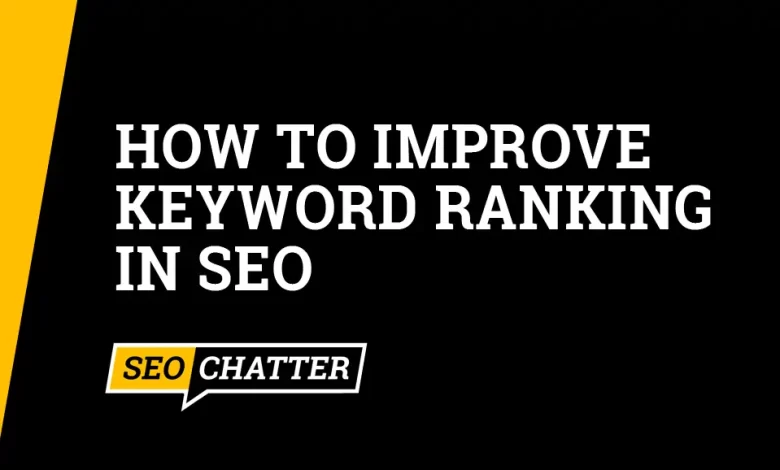How to Improve Keyword Ranking In SEO (15 Best Practices)-SEO

This guide explains how to improve keyword ranking performance.
Below, you’ll find a step-by-step tutorial on how to improve SEO ranking on Google, Yahoo, and Bing using proven keyword strategies for success. The ultimate goal is to give you a complete set of instructions and best practices to follow to improve keyword performance for any web page on your site.
Please enable JavaScript
How to Improve Keyword Ranking In SEO
1. Identify Relevant and High-Traffic Keywords for the Page
Identifying the most relevant and high-traffic keywords for your page is an essential first step to improve keyword ranking in SEO.
Start by researching for relevant keywords for the page by using tools like Google Keyword Planner, KWFinder, SE Ranking, or Semrush to find terms and phrases your target audience is searching for based on the primary content topic.
Once you have a list of potential keywords, use metrics like search volume and keyword difficulty (or competition) to narrow the list to the most valuable keywords for the page
Remember to choose keywords that are highly relevant to the content and consider the intent behind the search query to ensure you’re providing the best possible user experience. Also, use the tips mentioned in step 3 below to improve Google search ranking with on-page SEO strategies.
2. Add Semantically Related Keywords to the Content
In addition to using relevant and high-traffic keywords on your page, it’s vital to include semantically related keywords within your content. Doing so helps search engines understand the overall theme and topical relevance for your readers.
Adding semantically related keywords to the page also boosts the overall expertise and authority of the content because you’re providing proof that you’re an expert on the topic by including closely related entities on the page.
You can find semantically related keywords to improve keyword performance with these strategies:
- Search for a keyword phrase in Google and scroll down to the Related Searches section. Pick the terms that are most closely connected to your primary topic and use them naturally in your content. (See note below for an additional tip.)
- Go to Google Images and search for your target keywords. The word buttons that appear under your search are semantically related words you can include in your content.
- Go to Wikipedia and search for the primary keyword phrase or the main topic. All of the linked words on the Wikipedia page are considered first-degree entities that are semantically related. Use as many as you can in your content to help boost keyword rankings.
- Look for an LSI keyword generator online. A tool like this can generate a long list of semantically related keywords for you to use in your content to improve SEO ranking.
Note: The related searches on Google that do not apply to your content can be used to create new (topically relevant) articles on your website. You can then internal links from those articles to the web page you want to boost in the SERPs. See step 8 below for more details on this SEO strategy.


3. Optimize Key Areas for On-Page SEO
Another way for how to improve keyword ranking in Google, Yahoo, and Bing is with on-page SEO.
As mentioned in this other article on how you can improve your keyword search results, optimizing key areas for on-page SEO, including the title tag, meta description, header tags, body copy, and images, is also essential for higher keyword rankings.
Follow these basic on-page SEO strategies for success:
- Title Tag: Include your primary keyword at the front of the title tag and keep it under 60 characters to ensure it displays correctly in search results.
- Meta Description: Use a compelling meta description that includes your primary target keyword and accurately summarizes the content on your page.
- Header Tags: Use keyword-optimized header tags to break up content and structure your page. The H1 and H2 tags have the most weight for SEO.
- Body Copy: Use your target and related keywords throughout the body copy of your page. Place as many of the primary and secondary keywords within the first 100 words of content to improve keyword prominence. However, make sure to use natural language to avoid keyword stuffing.
- Images: Optimize images by including descriptive file names, ALT text, and captions with your target keywords for additional opportunities to rank for those terms.
4. Create High-Quality Content That Satisfies User Intent
Creating high-quality content that satisfies user intent is crucial for improving your keyword rankings. To make such content, you should conduct thorough research, use appropriate language and tone, adopt a clear and concise writing style, include multimedia elements that enhance the content, and use internal linking to other relevant web pages.
Additionally, focus on providing valuable information that answers users’ questions, solves their problems, and provides the data they seek. Doing this will improve the user experience, establish trust and authority with your audience, and ultimately lead to more traffic, engagement, and higher Google search rankings.
5. Include a Variety of Content Formats
Including various content formats on your website can help improve your keyword rankings by attracting and engaging a wider audience. Using a mix of content formats like text, videos, infographics, audio files, and interactive content, you can provide users with different ways to consume your content and keep them on your website longer, leading to increased engagement, social shares, and backlinks.
Using different formats diversifies your SEO strategy and protects your website from risk. For example, if Google starts to favor video content over written content, having a variety of formats on your web pages will help ensure you can still rank for your target keywords.
6. Use Schema Markup to Improve Keyword Rankings
Using schema markup can help improve SEO ranking and visibility by offering context to search engines about your page. Schema markup is a form of structured data added to your website’s HTML code offering more detailed information about your content with different markups for organizations, products, services, reviews, and more.
As explained in this other guide on how you can improve SEO fast, using schema markup, can help search engines better understand the content on your website and improve organic visibility in the search results.
Using schema markup also enhances the user experience by providing additional information about your content in the search results listing, leading to higher click-through rates, more traffic, and improved keyword rankings.
Fortunately, Google has created a free Structured Data Markup Helper to make it easy for you to take advantage of this tactic for increased organic visibility and rankings for your web pages.
7. Make Your Content More Shareable to Get Backlinks
Making your content more shareable can help you get more backlinks, increasing your site’s keyword rankings. One way to do this is by creating high-quality, valuable content that resonates with your target audiences, such as informative blog posts, engaging videos, eye-catching infographics, or podcasts.
Another strategy is to add social sharing buttons, making it easier for users to share your content on social media platforms and other websites, generating more backlinks with ease.
Building relationships with influencers and other websites in your niche can also help. For example, interviewing top experts in your field to get original quotes that can be added to your content can be invaluable to increase Google search rankings.
By collaborating with these individuals, you can improve the expertise and trust of your content while also getting more shares from those influencers. As a result, your content will get a natural increase in organic visibility and attract more backlinks; improving your keyword rankings.
8. Add More Keyword-Optimized Internal Links
Keyword-optimized internal links provide additional context and authority to your website’s pages. Internal linking involves linking from one page on your website to another.
When creating internal links for SEO, consider the following:
- Use descriptive anchor text that includes the target keyword for the linked page.
- Link from high authority pages to lower authority pages to distribute link equity for higher rankings.
- Include a reasonable number of internal links (around 3-5) to provide a positive user experience.
- Ensure that the linked pages are relevant to the topic and context.
Adding more keyword-optimized internal links can help search engines better understand your website’s structure and gives users a more seamless and informative browsing experience. Plus, Google states in its guidelines that the more times you link to a web page on your site, the more important you’re telling the crawlers the content is for your audience. As a result, more internal links can lead to higher search engine rankings for your target keywords.
9. Ensure Your Website Is Mobile-Friendly
Making your website mobile-friendly is crucial for improving your keyword rankings. With most online traffic coming from mobile devices, search engines prioritize mobile optimization as a ranking factor. To ensure your website is mobile-friendly, use a responsive design that adapts to different screen sizes, ensure that text is readable without zooming, use mobile-friendly fonts, and make buttons and links large enough to be clickable with a finger or thumb.
By making your website mobile-friendly, you’ll provide a better user experience and increase the chances of your website ranking higher in search results for your intended keywords.
10. Improve Page Loading Times
Improving page loading times is crucial for increasing your keyword rankings, as search engines prioritize fast-loading websites. A slow-loading website can negatively impact user experience, which leads to increased bounce rates and decreased engagement.
To improve page loading times, consider optimizing images with compression to lower the file size, reduce server response time with a fast host, minify CSS and JavaScript files with site speed plugins, enable browser caching, and use a content delivery network (CDN) to serve content from servers closest to the user’s location.
By improving page loading times, you’ll provide a better user experience to your visitors, which can lead to increased engagement, conversions, and, ultimately, higher keyword rankings.
11. Increase Links from Social Media
Social media platforms allow sharing your content with a broader audience. The links from social media to your website can signal to search engines that your it’s reputable and valuable.
To increase links from social media, consider the following:
- Share high-quality, valuable content that encourages social media users to click on the link. For example, instead of just posting a link to a blog post, include the top takeaways in the social media caption.
- Use social media listening tools to monitor mentions of your brand and engage with your audience.
- Encourage social sharing of your content by adding website buttons and calls to action, such as click-to-tweet to Twitter.
- Collaborate with influencers in your niche to increase the visibility of your content by having them share links to your best content.
By increasing links from social media, you’ll improve keyword performance and boost brand awareness, engagement, and traffic to your website. See this social media link building guide for a list of 30+ backlinks you can create on Facebook, Twitter, LinkedIn, Pinterest, etc.
12. Take Advantage of Video Optimization
Video is a highly engaging format that gives users a more immersive and informative experience. Especially, when those videos supplement the written content on a website.
To optimize your videos for search engines, consider using descriptive titles and tags, adding captions and transcripts, optimizing video thumbnails, and hosting videos on a fast and reliable platform like YouTube or Vimeo.
Promote your videos through social media and other channels to increase visibility and attract backlinks. Also, embed those videos on relevant articles and blog posts to boost the number of plays and total watch time, which are key running factors for SEO for platforms like YouTube.
Optimizing your videos for both the native platform and the embedded web page will improve your keyword rankings and increase the total engagement, traffic, and conversions on your website.
13. Optimize Content for Voice Search
Optimizing your content for voice search is crucial for improving your keyword rankings and keeping up with the growing number of voice searches. Voice search queries are often longer, conversational, and targeted at specific questions or needs.
To optimize your content for voice search, use conversational language in the text, optimize for Featured Snippets by adding specific answer targets high up on the page, use long-tail keywords for header tags, and ensure your website is mobile-friendly. Also, optimize for local search queries if you’re trying to attract local customers to your business.
Following these tips will provide a better user experience for voice search users and increase the chances of your website ranking higher in search results for your target SEO keywords.
14. Track Your Keyword Rankings
Tracking your keyword rankings is vital for understanding the effectiveness of your SEO efforts and identifying areas for improvement. By monitoring your keyword and conducting keyword ranking analysis, you can see which keywords are performing well, which ones need some attention, and how your rankings change over time.
To track your keyword rankings, consider the following:
- Use a keyword tracking tool like SE Ranking, SERPWatcher, or Semrush to monitor your rankings.
- Track your rankings for various keywords, including primary, secondary, and long-tail keywords.
- Set up alerts to notify you of any significant changes in your rankings.
- Monitor your rankings over time to identify trends and opportunities for improvement.
By tracking your keyword rankings, you can make data-driven decisions about your SEO strategy and adjust your keyword optimization tactics to improve SEO rankings and attract more traffic to your website.
15. Do More of What Works
Doing more of what works is a simple but effective strategy for SEO. By analyzing your website’s analytics and identifying what content or tactics are already working, you can focus your efforts on those areas to maximize your results.
To do more of what works, consider the following:
- Analyze your website’s traffic sources to identify which channels drive the most traffic so you can put most of your time and energy into those sources.
- Analyze the top-performing content to determine which topics and formats resonate with your audience so you can create similar types of content.
- Identify the top-performing keywords and focus your SEO efforts on keeping those rankings.
- Identify the top backlinks in your website’s backlink profile and focus your link building efforts on getting more links from those domains.
By doing more of what works, you can build on your existing strengths and optimize your efforts to improve your keyword rankings and attract more traffic to your website.
Learn More About Keyword Ranking
The links below explain more about keyword ranking and how it applies to search engine optimization. Use these resources to expand your knowledge on the subject.
Improve Keyword Rankings In SEO Summary
I hope you enjoyed this guide on how to improve keyword ranking.
As you discovered, the several best practices for how to improve keyword performance in Google, Yahoo, and Bing, with the top strategies including identifying the right keywords to target, improving on-page SEO signals, satisfying user search intent, having a mobile-friendly site, using good internal linking, taking advantage of video optimization, and doing more of what works best for your website. Following the guidelines on this page will help you improve SEO rankings for keywords to get more organic traffic, customers, and sales.
Stephen Hockman is an entrepreneur and founder of SEO Chatter. He specializes in search engine optimization and digital marketing and has been fascinated with SEO since 2005. His goal is to share the best tips and news about search engine marketing to help you get more website traffic.
#Improve #Keyword #Ranking #SEO #Practices




